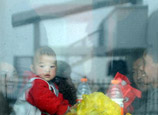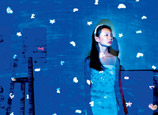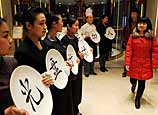
BEIJING, Jan. 26 (Xinhua) -- Chinese consumers are expressing concerns about the safety of New Zealand's dairy products since its government officials disclosed on Thursday that a toxic substance has been found.
New Zealand's Ministry of Primary Industries claimed that "very low levels" of Dicyandiamide (DCD), which has been found by dairy giant Fonterra Cooperative Group in a random sampling last September, does not pose a food safety risk to consumers.
Although there is no internationally set ceiling for DCD residues in food, high doses of the substance are considered toxic to humans.
" 'Very low levels' means 100 times lower than safety limits established by the European Commission," Kelvin Wickham, president of Fonterra Greater China and India, said Saturday in an interview with Xinhua via email.
He offered no further details by saying that the New Zealand government concluded their products are safe to consume, and "not any residues (were) found in infant formula."
But Chinese consumers are still not assured if "very low levels" could be harmful.
Internet user "YiyiMMqiong" said at China's Twitter-like service Sina Weibo that she had been feeding her baby with a New Zealand brand infant formula for a long time.
"I'm very upset now. Is it contaminated by DCD?" asked "YiyiMMqiong".
She is not alone. Many people called on the authorities to clarify which products had been contaminated and whether those had been imported to China.
New Zealand dairy products account for nearly 80 percent and 40 percent in China's import market and infant food respectively, Song Liang, a dairy analyst of the Distribution Productivity Promotion Center of China Commerce, told a Beijing-based newspaper on Friday.
Since a 2008 scandal, in which milk was laced with an industrial chemical melamine, led to the deaths of at least six babies and sickened 300,000 others, dairy products from New Zealand, Europe and Australia have been hotly pursued by consumers on the Chinese mainland.
Microblog user "Chafengjun" said he cannot believe New Zealand's dairy product is tainted.
If it is true, the only safe choice is to farm a cow by himself, he joked.
As 60 percent of world dairy manufacturers and suppliers import milk powder from New Zealand, the scare may also weigh on big brands, Song said.
"The milk products exported from Australia, Denmark, France and the Netherlands might benefit a lot," he said.
Meanwhile, the news may cause another panic among consumers, who worried about the price surge of unaffected dairy brands.
China's grocery store chains normally stock milk products on Saturday.
A staff surnamed Li from a Carrefour store in Chaoyang District of Beijing said, "No official notice has been released to remove any dairy products from shelves, but we will keep a watchful eye on the situation."
Two New Zealand fertilizers, Ravensdown Ltd. and Ballance Agri-Nutrients, have suspended sales of DCD, which was applied by farmers to improve water quality and promote grass growth.
"DCD has a low toxicity. It is applied as a fertilizer in the United States, Japan and China," said food safety expert Zhu Yi, associate professor of China Agricultural University.
Last year, the U.S. Food and Drug Administration added DCD to a list of substances to test for.
Chinese netizens hope the government could test DCD in milk powder from now on.
"I was so disappointed with the dairy market. Melamine, DCD, etc., I don't know what else will be detected tomorrow," "Moxi Shengli" wrote on Sina Weibo.
















 Photo story: The art of food, the art of life
Photo story: The art of food, the art of life


![]()
